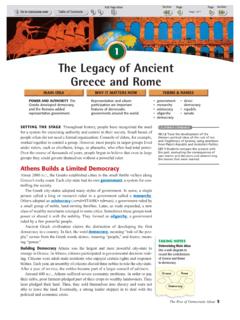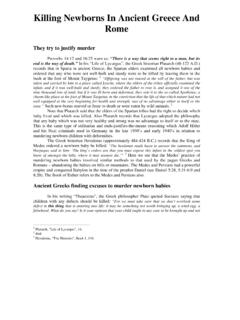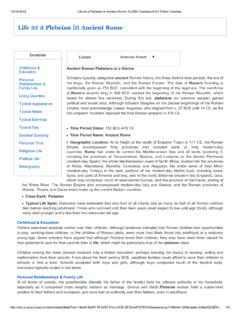Transcription of Social Life in Ancient Greecex - nokesoft.com
1 1 Social life in Ancient Greece by Miljana Ivkovi GIMNAZIJA: STEVAN JAKOVLJEVI , Vlasotince Social life in Ancient Greece Author: Miljana Ivkovi , I/1 Mentor: Biljana Pipovi Social life in Ancient Greece Author: Miljana Ivkovi , I/1 Gimnazija ,,Stevan Jakovljevi Mentor: Biljana Pipovi , profesor engleskog jezika ABSTRACT This essay is about the life of people in Ancient Greece. Greece is the cradle of civilization. The earliest Greek civilizations thrived nearly years ago. Yet, their culture still impacts our lives today in the arts, philosophy, science, math, literature, and politics. Thoughts and inventions of their philosophers have greatly facilitated the life of today. Progressiveness of Greek civilization is amazing even now. Its development and prosperity has fueled some of the finest minds of modern culture. Greek Mythology is an inexhaustible source of inspiration, and inspiration.
2 Greece has been and will remain a subject of our time. Key words: Social life , beliefs, political beliefs, interests REZIME Ovaj esej je o zivotu ljudi u Staroj Grckoj. Grcka je kolevka civilizacije. Najstarija gr ka civilizacija cvetala je pre skoro godina. Pa ipak ona jos uvek uti e na na e ivote danas u oblasti umetnosti, filozofije, nauke, matematike, knji evnost i politiku. Misli i izumi njihovih filozofa veoma su olak ali dana nji ivot. Naprednost Gr ke civilizacije je zadivljuju a ak i sada. Njen razvoj i prosperitetnost je podstakla neke od vrhunskih umova moderne kulture. Gr ka mitologija je neiscrpan izvor inspiracije i nadahnu a. Gr ka je bila i osta e predmet prou avanja dana njice. Klju ne re i: Drustveni zivot, verovanja, politicka shvatanja, interesovanja Introduction Greece, a mountainous country in thein prehistoric times. Its history arrival of Indo-European tribes whothe second millennium BC in theisland of Crete and Mycenae.
3 Thereunite under the rule of the king Greece Mycenaean civilization developed Ancient Greece refers to theBC and the period which followeddeveloped in continental Greece,main four-Hellenic tribes from that timeunsuccessful attempts to conquerexperienced a peak in mid-fifth became the cultural center of the HeSparta led to the Peloponnesian War Ancient Greece is todaycivilization of the most significantconsidered to be credited withmathematics, physics, biology, astronomy, architecture, history modern society. The Ancient Greeksspeech. The influence of Hellenic civilizationEnlightenment. In modern times the influencethe cultural power of neoclassicismemerged around the Mediterranean SeaMediterranean, setting up the colonyknown as a period of general waves of Greek and Macedonianeducated people. They brought with themand culture. On the other hand, werethe old East. By mixing and intertwiningHellenistic culture developed.
4 Country in the far south of the Balkan Peninsula was begins at the beginning of the second millenniumtribes who called themselves Hellenes, Romans and in the Hellenistic world, the two civilizations flourishedThere were many independent kingdoms that would of Knossos, while on the Peloponnese peninsuladeveloped. refers to the civilization that began to rise during the eighthwhich followed the collapse of the Mycenaean civilizationGreece, Asia Minor, the Mediterranean and Black Sea coastsfrom that time were Dorci, Eolci, Jonci and Achaeansto conquer Persia, Greece, early 5th century BC Hellenicfifth century BC. This particularly declared in Athensof the Hellenic world. The growing rivalry betweenWar which divided and weakened the Hellenic worldtoday regarded as the cradle of Western civilization and thesignificant contribution to the history of mankind. The Ancient Greekscredited with the discovery in the fields of philosophy,, astronomy, architecture, history and to bill the basicThe Ancient Greeks were responsible for the issuing of democracyof Hellenic civilization had particular impact of the Renaissancethe influence of Hellenic civilization expressed particularly through of neoclassicism in the 18th and 19th century.
5 In the old worldthe Mediterranean Sea, the Greeks were good sailors. They sailedcolony and set sail wherever it was possible. Hellenisticprosperity. East coast of Alexander's kingdom wasand Macedonian settlers. Among them were soldiersbrought with them and helped spreading of Greek customs, languagewere acquainted with the culture and lifestyle of the peopleand intertwining of the two cultures, Hellenistic and Eastern was inhabited the second millennium BC, the Greeks. During flourished: the ould eventually peninsula and central eighth century of the Mycenaean civilization, and that Black Sea coasts. The Achaeans. After Hellenic civilization in Athens, which between Athens and world. civilization and the The Ancient Greeks of philosophy, literature, the basic norms of of democracy and free the Renaissance and particularly through In the old world that They sailed around the Hellenistic era is was constantly soldiers, traders, and customs, language of the people of and Eastern - a rich 1.
6 State and Social system Greece is mostly mountainous country, intersected by river valleys and fertile plains. This kind of landscape conditioned its political fragmentation. The Helen had never created a single state, but they lived in independent cities, Polis. The Greek cities were originally monarchies. In a country always short of farmland, a small number of landowners had the power. They formed a warrior aristocracy fighting frequent petty inter-city in small wars around the country. But the rise of a mercantile class shown by the introduction of coins introduced class conflict into the larger cities. From 650 BC onwards, the aristocracy overthrown and replaced by populist leaders called tyrants, a word that did not have the modern meaning of oppressive dictators. The population was divided into tribes, clans and lineages, families were in fact the germ of aristocracy.
7 The head of each community there was a king in governing his country helped the National Assembly. The Development of polis The most important Greek polises were Sparta, Athens and Corinth. Sparta was long the most powerful Doric polis. In Ancient times it was thought that the power of Sparta rested on a good and harmonious Social furnishing. Its population was divided into spartijate (full citizens), perijeke (merchants and farmers) and helots (slaves of the state). It had the oligarchic system of government, and was ruled by two kings. Thanks to strict education and way of life , the Spartans were exceptional soldiers. Athens, the Ionian polis, was established in Attica. It was shaken by conflicts of the aristocracy and the people; the struggle finally gave birth to democracy. Barbarians were acquainted with the colony through the Greek language, religion and lifestyle. Many of them received the Greek customs and culture.
8 This process is called Hellenization Democracy is a charming form of government, full of variety and disorder; and dispensing a sort of equality to equals and unequals alike. Plato Democracy is a system of government in which power belongs to the demos, that is people. Most often it is considered that Herodotus first used the word democracy. The first step towards democracy was Solon's reforms. The time of the expulsion of the Persians from Hellas to the outbreak of the Peloponnesian War was the golden age of Athens. For its rise, the military leader and statesman Pericles was largely credited. He came from a distinguished aristocratic family. Athens, under his wise leadership, became the most powerful, richest and most beautiful polis. Pericles as a great orator and a wise politician quickly gained the support of the demos. Pericles promoted the arts and literature; it is principally through his efforts that Athens holds the reputation of being the educational and cultural centre of the Ancient Greek world.
9 He started an ambitious project that generated most of the surviving structures on the Acropolis (including the Parthenon). This project beautified the city, exhibited its glory, and gave work to the people. Pericles also fostered Athenian democracy to such an extent that critics call him a populist. Law Solon was one of the archons (a Greek word that means "ruler" or "lord ) in Ancient Athens. In 594 Solon made several important reforms, which loosened the tension of civil war breaking out. Solon also published all the laws of the Athenian Society. Solon's solutions were, of necessity, compromises. Because of these reform compromises and other legislation, posterity refers to him as Solon the lawgiver. Solon, a lyric poet and the first Athenian literary figure whose name we know, came from an aristocratic family which traced its ancestry back 10 generations to Hercules, according to Plutarch.
10 Aristocratic beginnings did not prevent him from fearing that someone of his class would try to become tyrant. In his reform measures, he pleased neither the revolutionaries who wanted the land redistributed nor the landowners who wanted to keep all their property intact. He wrote laws that required that people who lived a certain distance from public wells needed to dig their own, laws that forbade the export of agricultural goods except olive oil, laws that restricted the amount of land a man could own, laws that allowed venders to charge any kind of interest rate they wanted to, and even laws that prohibited dealing in perfume. Solon also created many family laws, which were laws that regulated the behavior of men and women. He wrote laws on allowances in marriage and adoption, as well as laws concerning inheritances and supporting roles of parents. Men if they were not training in military, or discussing politics, went to the Theatre for entertainment to watch dramas that they could relate to, including tragedies and comedies.









